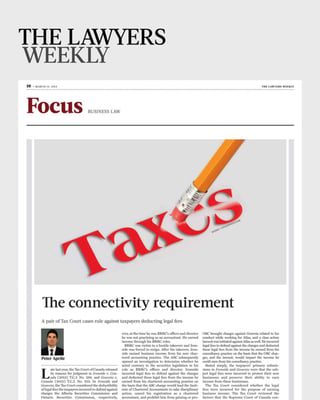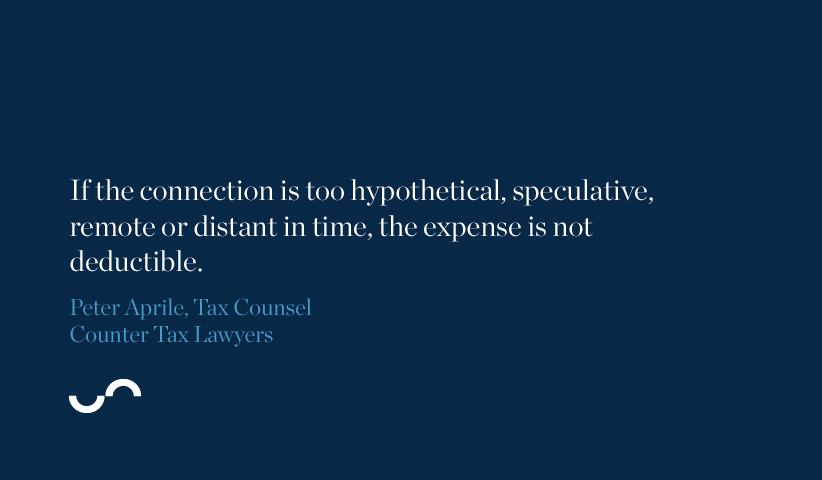

Late last year, the Tax Court of Canada released its reasons for judgment in Ironside v. Canada [2013] T.C.J. No. 298, and Gouveia v. Canada [2013] T.C.J. No. 353. In Ironside and Gouveia, the Tax Court considered the deductibility of legal fees the taxpayers incurred to defend against charges the Alberta Securities Commission and Ontario Securities Commission, respectively, brought against them. The facts and primary arguments inIronside and Gouveia were similar and, therefore, we will highlight the salient facts for brevity.
In Ironside, the taxpayer, an accountant, earned business income as officer and director of a corporation in the oil and gas industry (BRRC). However, at the time he was BRRC’s officer and director he was not practising as an accountant. He earned income through his BRRC roles. BRRC was victim to a hostile takeover and Ironside was forced to resign. After the takeover, Ironside earned business income from his new chartered accounting practice. The ASC subsequently opened an investigation to determine whether he acted contrary to the securities legislation in his role as BRRC’s officer and director. Ironside incurred legal fees to defend against the charges and deducted these legal fees from the income he earned from his chartered accounting practice on the basis that the ASC charge would lead the Institute of Chartered Accountants to take disciplinary action, cancel his registration as a chartered accountant, and prohibit him from gaining or producing income in this capacity.
In Gouveia, Gouveia was employed as a freezer company’s director and officer (Atlas). In 2002 and 2003, Gouveia reported the employment income he earned from Atlas along with business income earned from a sole proprietorship management consultancy business. In 2003, Gouveia resigned from Atlas. The OSC brought charges against Gouveia related to his conduct while working for Atlas, and a class action lawsuit was initiated against Atlas as well. He incurred legal fees to defend against the charges and deducted these legal fees from the income he earned from his consultancy practice on the basis that the OSC charges, and the lawsuit, would impact the income he could earn from his consultancy practice.

Stated simply, the taxpayers’ primary submissions in Ironside and Gouveia were that the subject legal fees were incurred to protect their new businesses and preserve their ability to earn income from these businesses.
The Tax Court considered whether the legal fees were incurred for the purpose of earning business income. The Tax Court reviewed the factors that the Supreme Court of Canada considered in Symes v. The Queen [1993] S.C.J. No. 131, to determine whether the legal fees were incurred for the purpose of earning business income:
- First, whether the expense was the type that similar businesses would normally incur, and whether the deduction is ordinarily allowed as a business expense by accountants.
- Second, whether the particular expense would have been incurred if the taxpayer was not engaged in the pursuit of business income.
- Third, whether the need to which the expense related would have existed “but for” the business.
The Tax Court held that the central component the Symes factors attempt to reveal in these types of cases is the connectivity between the need which the expense meets and the business itself. Moreover, the connection between the expense and the earning of the income must be direct and immediate in time. If the connection is too hypothetical, speculative, remote or distant in time, the expense is not deductible. “Not only must taxpayers adduce evidence of a direct relationship between the ‘need that the expense meets’ and the business, but they must also establish a connection between the expense and the ability of the taxpayer to earn future income from that business;’ ruled Justice Diane Campbell in Ironside. “This adds another dimension to the thread of the connectivity requirement that runs through the caselaw.” In Ironside and Gouveia, the Tax Court concluded that the need to defend was not directly related to the subject businesses.

In addition, the legal fees were severable from the income-earning operations and not a consequence of the risk of earning income from the subject businesses. Ironside did not incur the legal fees in the course of his accounting business. Instead, he incurred the legal fees while working at BRRC. The Tax Court held that the connection between these legal fees and Ironside’s accounting business was too remote. Similarly, Gouveia did not incur his legal fees in the course of his consultancy business; they were a direct result of his Atlas directorship and office. In these circumstances, the legal expenses were personal and not incurred to protect actual, or potential, consulting business income. The Tax Court dismissed both of the appeals.
The Tax Court’s decisions in Ironside and Gouveia indicate that the connectivity analysis will play an important role for the courts in determining the deductibility of legal fees to defend against regulatory offences, civil actions and criminal charges.

.jpg?width=120&name=Counter%20Tax%20Litigators%20Logo%20Stacked%20(MidnightBlue%20on%20White).jpg)






.png?width=400&height=400&name=CT-How_Can_We_Help-22_july_NewGraphic_b(small).png)